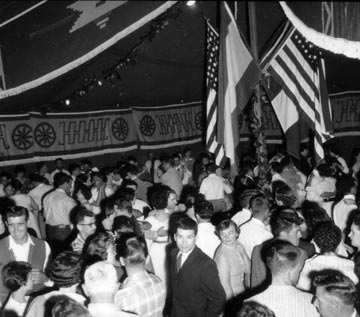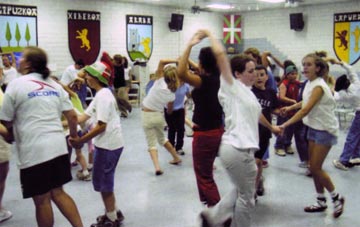Basque Collective Action in the United States: Creation, Identity and Challenges
Argitxu CAMUS ETCHECOPAR, PhD candidate at the University of Nevada, Reno
The North American Basque Organizations, Inc., commonly known as NABO, regroups thirty eight Basque clubs which together work toward the promotion of Basque heritage in the United States. Until the creation of NABO, there was no formal communication and cooperation between the various Basque American clubs. With the objective of unifying Basques in the United States, representatives from several clubs met in Sparks, Nevada in March 1973 and formed a federation which created a network within the Basque community. NABO functions similarly to a confederation because it may not infringe on the autonomy of any individual Basque institutions. It is a service organization.
The time period in which NABO was formed (1973) prompts an important question: Why did Basques wait until the 1970s to form a federation? It must be said that only a few examples of Basque collective actions can be found in the United States before the 1950s. Many factors militated against the persistence of Basques as a distinct group before that date; among other factors, the involvement of many Basques in the sheep industry precluded population concentrations of Basque Americans and the regional distinctions further complicated the creation of a collective action. In 1975, Douglass and Bilbao in their book Amerikanuak identified the areas of predominantly French Basque and Navarrese population (California, Arizona, New Mexico, Colorado, Wyoming), those of predominantly Bizkaian population (Idaho, Oregon), and the areas where all three groups are represented (Nevada, Utah).
But after the 1950s, we assist to important developments within the wider society (the U.S. Roots Phenomenon); at the same time the inspiring Western Basque Festival in 1959 held in Sparks, Nevada, for the first time, displayed Basque identity publicly and led to the proliferation of Basque formal institutions in the United States. Hence, gradually, as Basques from different areas started interacting through the various Basque festivals, the idea of a federation uniting Basques in the U.S. gradually emerged and was implemented in 1973.
 |
| Western Basque Festival in 1959. |
NABO has played an important role in the construction of an original Basque American identity. NABO promoted a sense of “we Basque Americans” as opposed to French or Spanish Basque. NABO, -through its rotation of meetings and Convention festivals, its activities gathering Basques from all ages, and all origins-, interconnected the associations and the people together. NABO promoted a sense of dual or hyphened identity that synthesizes the Basque and the American identities. The Basque identity as manifested in the United States does not give importance to Old World regional differences, and it even seeks to embrace the Basque Country traditions in its entirety. We thus can discern different steps in the evolution of the making of the Basque American identity. First step, with the institutionalization of Basque festivals and the increasing number of Basque Clubs, a sense of dual identity is emphasized, Basque and American, in the different communities. Then, second step with NABO, is a sense of “we Basque Americans” regardless of the old country regional barriers and what community they are from in the United States. And the third step, that is still in the making, and that NABO contributes a lot to, is “we Basques of the diaspora.” Contacts are now made with Basques in Mexico and Canada, some contacts with Argentina.
While the diaspora is becoming conscious of itself, the Basque Country also increasingly is learning about the existence of its diaspora. Until the 1980s, the relations between the Basque Country and the United States were more private, usually family ties, whereas now these relations have become more public. The Basque Country in its entirety is becoming increasingly aware of its diaspora. The phenomenon started earlier in the Southern part of the Basque Country with a real will of the Basque Autonomous Government -quickly after its formation- of increasing contacts with Basques outside of the Basque Country. But these past years, in Iparralde, it is amazing how, more a more, the media talk about the Basques outside of the Basque Country. For instance, in 2005, the city council of Azkarate (Baxe Nafarroa) acquired the castle of the village with the idea to make it an International Center of the Basque Diaspora. The Basque Autonomous Government collaborates with and subsidizes diaspora communities spread around the world -including the United States- therefore contributing greatly to the improvement of communication between the different clubs and helping NABO in the realization of many of its programs.

In its 34 years of existence, not only has NABO increased in number, but also in scope. Originally, NABO gathered eight Basque institutions, and is now composed of thirty eight institutions. If NABO started as a means to create communication among clubs, it has certainly grown beyond that. It has worked effectively as a vehicle of preservation of Basque culture in the United States, and has made the Basque culture more visible, bringing it positive status.
But NABO, like the other Basque Clubs in the U.S., in order to succeed, will have to face many challenges in the near future such as structural challenges (it is a volunteer organization) or the fact that it needs to attract the youth in order to assure the future of Basque culture in the United States. Nowadays, in the United States, even though immigration from the Basque Country is quasi non-existent, according to the 2000 United States Census, approximately 58,000 people define themselves as Basques; a number composed of both immigrant generation and their descendants. But NABO, although comprising most of the Basque American Clubs, does not represent the majority of the self-defined Basques in the United States. Only ten percent of this population takes part in the different Basque clubs.
euskonews@euskonews.com
